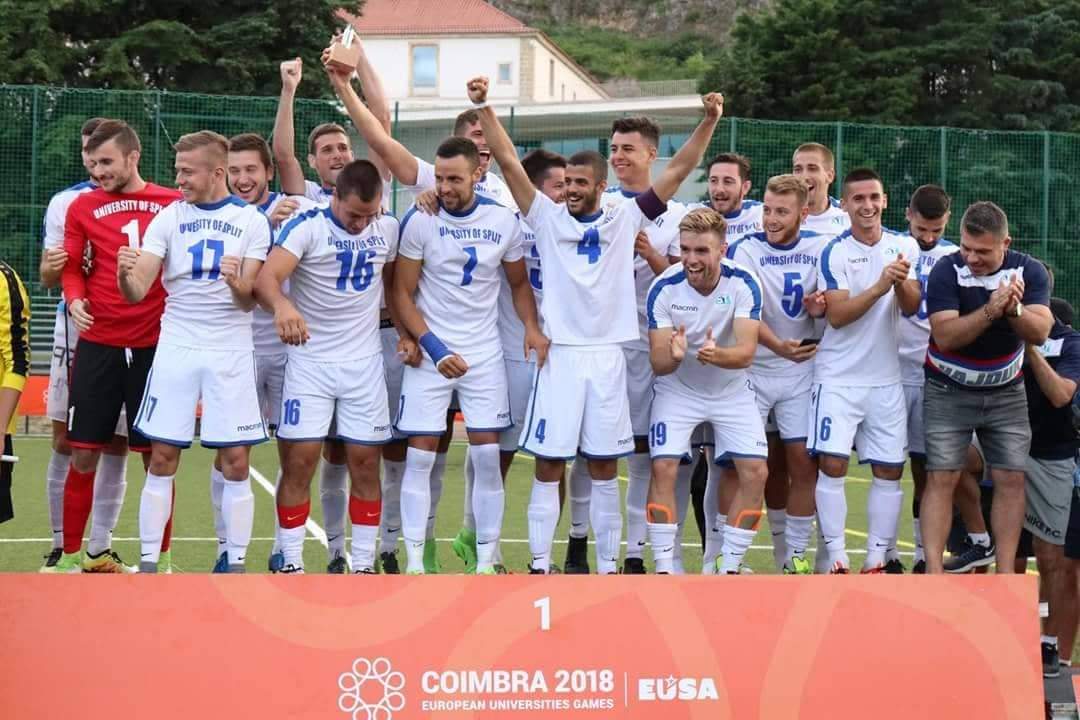 JINJIANG, People’s Republic of China – As the inaugural Kelme 2019 FISU University World Cup – Football kicks off in this ancient-yet-modern Chinese city on 21 November, it will mark the arrival of a new chapter in the international university sport movement.
JINJIANG, People’s Republic of China – As the inaugural Kelme 2019 FISU University World Cup – Football kicks off in this ancient-yet-modern Chinese city on 21 November, it will mark the arrival of a new chapter in the international university sport movement.
For the first time ever, the best university teams from around the globe will compete in the world’s most popular sport, for the title of ‘University World Champion’.
432 of the world’s best university footballers have descended upon Jinjiang, the city which is known as the South Gate of China and is the starting point to the Maritime Silk Road. The 24 teams that have made it to the first-ever world finals of FISU’s newest and exciting event represent 15 countries and five continents.
 Igor Milioransa and Bruno Lopez de Moura of Paulista University, BrazilThe 16 men’s teams and 8 women’s teams booked their ticket to Jinjiang through five tough continental qualifying tournaments that took place over the last year. Here in China, they will play a total of 62 matches from 21 November – 1 December. The only university that has been able to qualify for both, the men’s and women’s competitions is Paulista University from Brazil.
Igor Milioransa and Bruno Lopez de Moura of Paulista University, BrazilThe 16 men’s teams and 8 women’s teams booked their ticket to Jinjiang through five tough continental qualifying tournaments that took place over the last year. Here in China, they will play a total of 62 matches from 21 November – 1 December. The only university that has been able to qualify for both, the men’s and women’s competitions is Paulista University from Brazil.
“In this competition, we want to become the champions,” said Igor Milioransa of Paulista University upon his arrival in Jinjiang. “It is a great experience, because for many of the guys it is their first time travelling outside Brazil.”
“This country is beautiful, the organisation is great, and we are having so much fun on this trip. But the main objective is to win. We came here for this.”
“We won all our matches in the qualifying tournament,” added his teammate Bruno Lopez de Moura, who has only just begun his Physical Education studies at Paulista. “For the last five years I have been playing in Germany, so I have had only one month with the university team. But the others have been playing together for years and we make a good team!”
 Marina Klimchanina and Elena Tupikina of Siberian Federal University, RussiaThere are two teams from China in the women’s tournament and three in the men’s field. Other than Brazil, the only other countries that have representation in both tournaments are Russia, Australia and Thailand.
Marina Klimchanina and Elena Tupikina of Siberian Federal University, RussiaThere are two teams from China in the women’s tournament and three in the men’s field. Other than Brazil, the only other countries that have representation in both tournaments are Russia, Australia and Thailand.
“We like it so much here in China, the atmosphere is really nice,” said Elena Tupikina of the Siberian Federal University. “Since we have arrived everything has been going quickly and smoothly, so we are comfortable.”
“Our intention is to win,” she continued. “We have a fighter team that is ready for battle and we are looking to finish in first place.”
The men’s tournament has four groups of 4 teams each and the women’s field has two groups of 4 teams each. After round robin format in group play, the top 8 men’s teams will move into quarterfinals while in the women’s tournament, top 4 teams will go directly into the semi-finals. There will also be matches for the full rankings and final standings. The women’s winner will be crowned on 30 November and the men’s finals will take place on 1 December.
 The University of Split, Croatia, that won the European qualifying tournament“I extend my sincere thanks to our friends from the Federation of University Sports China, to the authorities of Jinjiang and the Fujian Province for their collaboration in hosting this inaugural event,” said FISU President Oleg Matytsin. “This is a wonderful time for university sports. Since the very beginning of the international university sports movement, only national teams have competed at the international level. FISU has now brought in the University World Cup format as universities look to stand out from each other. It has become clear that the athletes also appreciate the opportunity to play for university colours and university pride.”
The University of Split, Croatia, that won the European qualifying tournament“I extend my sincere thanks to our friends from the Federation of University Sports China, to the authorities of Jinjiang and the Fujian Province for their collaboration in hosting this inaugural event,” said FISU President Oleg Matytsin. “This is a wonderful time for university sports. Since the very beginning of the international university sports movement, only national teams have competed at the international level. FISU has now brought in the University World Cup format as universities look to stand out from each other. It has become clear that the athletes also appreciate the opportunity to play for university colours and university pride.”
Among the 14 training and competition venues in Jinjiang, some are purpose built for the University World Cup – Football. This includes the majestic Football Park Stadium located at the foot of the Lingyuan mountain. The sprawling complex is spread over more than 85,000 square metres, of which the football stadium is 13,000 square metres. With a capacity of 8,000 in the main stadium, Jinjiang Football Park Stadium is the first professional football stadium in the Fujian Province. It will host the opening and closing ceremonies as well as the finals.
The FISU University World Cup – Football is the first major international sports event for Jinjiang and is also the first time that a football tournament is being held simultaneously for both genders at this international level.
The opening ceremony, scheduled for 19:00 (local time) will be broadcast by Fujian TV, as well as seven other marquee matches. The showcased opening match between Autonomous University of Mexico State (MEX) and Beijing Institute of Technology (CHN) will also be broadcast on CCTV 5.
All ceremonies and matches will be streamed live on FISU.TV. Further information on the University World Cup – Football is available here.
UNIVERSITIES IN WORLD FINALS
Men
-
Autonomous University of Mexico State (MEX)
-
Bangkok Thonburi University (THA)
-
Beijing Institute of Technology (CHN)
-
Borys Grinchenko Kyiv University (UKR)
-
Hohai University (CHN)
-
International University of Language and Media (ITA)
-
Julius-Maximilians University of Wurzburg (GER)
-
Kotebe Metropolitan University (ETH)
-
Myongji University (KOR)
-
Paulista University (BRA)
-
Smolensk State Academy of Physical Culture, Sport & Tourism (RUS)
-
Taiyuan University of Technology (CHN)
-
University of Malaga (ESP)
-
University of Split (CRO)
-
University of the Republic (URU)
-
University of Wollongong (AUS)
Women
-
Beijing Normal University (CHN)
-
Paulista University (BRA)
-
University of Sydney (AUS)
-
University of Lausanne (SUI)
-
College of Asian Scholars (THA)
-
Siberian Federal University (RUS)
-
Donghua University (CHN)
-
University of Ottawa (CAN)



